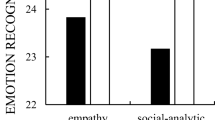Abstract
The Emotion Regulation of Others and Self Scale (EROS) is commonly used to measure individual differences in the use of strategies to regulate one’s own and other people’s emotions. This study aimed to examine its psychometric properties and measurement invariance across sex in a Portuguese clinical sample. For this purpose, we tested the factorial structure of the EROS in a sample of 390 adults (259 women; Mage = 34.33; SD = 9.99) undergoing active psychotherapy in a private clinic. The confirmatory factor analysis showed that the four-factor solution proposed by the original authors (intrinsic affect-improving, intrinsic affect-worsening, extrinsic affect-improving and extrinsic affect-worsening) fitted well to our data. Invariance across sex was determined by using multi-group analyses. Additionally, reliability analysis indicated good coefficients for all the dimensions. The pattern of associations of the EROS subscales with dispositional mindfulness, ruminative thinking, psychological inflexibility, emotional intelligence, and psychopathological symptoms were examined. As expected, small to moderate correlations were found evidencing the convergent construct validity of the EROS. Findings suggest that the EROS is a psychometrically sound approach for assessing individual differences in emotion regulation in clinical samples.

Similar content being viewed by others
Data availability
Data presented in this study are available on request from the corresponding author. The data are not publicly available due to privacy and ethical restrictions.
References
Barnett, M. D., Haygood, A. N., & Mollenkopf, K. K. (2021). Intrinsic and extrinsic emotion regulation strategies in relation to pathological narcissism. Current Psychology. https://doi.org/10.1007/s12144-021-01757-w
Bollen, K. A. (1989). Structural equations with latent variables. John Wiley & Sons. https://doi.org/10.1002/9781118619179
Bond, F. W., Hayes, S. C., Baer, R. A., Carpenter, K. M., Guenole, N., Orcutt, H. K., Waltz, T., & Zettle, R. D. (2011). Preliminary psychometric properties of the Acceptance and Action Questionnaire-II: A revised measure of psychological flexibility and experiential avoidance. Behavior Therapy, 42(4), 676–688. https://doi.org/10.1016/j.beth.2011.03.007
Bydlowski, S., Corcos, M., Jeammet, P., Paterniti, S., Berthoz, S., Laurier, C., & Consoli, S. M. (2005). Emotion-processing deficits in eating disorders. International Journal of Eating Disorders, 37(4), 321–329. https://doi.org/10.1002/eat.20132
Brandão, T., Tavares, R., Schulz, M. S., & Matos, P. M. (2016). Measuring emotion regulation and emotional expression in breast cancer patients: A systematic review. Clinical Psychology Review, 43, 114–127. https://doi.org/10.1016/j.cpr.2015.10.002
Canavarro, M. C. (2007). Inventário de Sintomas Psicopatológicos: Uma revisão crítica dos estudos realizados em Portugal [Psychopathological Symptoms Inventory: A critical review of studies carried out in Portugal]. In M. Simões, C. Machado, M. Gonçalves, & L. Almeida (Eds.), Avaliação psicológica: Instrumentos validados para a população Portuguesa [Psychological assessment: Validated instruments for the Portuguese population] (vol. III, pp. 305–331). Quarteto Editora.
Cardaciotto, L., Herbert, J. D., Forman, E. M., Moitra, E., & Farrow, V. (2008). The assessment of present-moment awareness and acceptance: The Philadelphia Mindfulness Scale. Assessment, 15(2), 204–223. https://doi.org/10.1177/1073191107311467
Chaves, B., Pereira, A. T., & Castro, J. (2013). Questionário de Pensamento Perseverativo: Validação da versão portuguesa [Perseverative Tinking Questionnaire: Validation of the Portuguese version]. Psiquiatria Clínica, 34, 3155–3162.
Chen, F. F. (2007). Sensitivity of goodness of fit indexes to lack of measurement invariance. Structural Equation Modeling, 14, 464–504. https://doi.org/10.1080/10705510701301834
Cobos-Sánchez, L., Flujas-Contreras, J. M., & Becerra, I. G. (2020). Relation between psychological flexibility, emotional intelligence and emotion regulation in adolescence. Current Psychology, 1–10. https://doi.org/10.1007/s12144-020-01067-7
Cohen, J. (1988). Statistical power analyses for the behavioral sciences (2nd ed.). Routledge. https://doi.org/10.4324/9780203771587
Cox, D. W., Motl, T. C., Bakker, M., A., & Lunt, R. A. (2018). Cognitive fusion and post-trauma functioning in veterans: examining the mediating roles of emotion dysregulation. Journal of Contextual Behavioral Science, 8, 1–7. https://doi.org/10.1016/j.jcbs.2018.02.002
Derogatis, L., & Fitzpatrick, M. (2004). The SCL-90-R, the Brief Symptom Inventory (BSI) and the BSI-18. In M. M. Maruish (Ed.), The use of psychological testing for treatment planning and outcomes assessment (3rd ed., vol. 3, pp. 1–41). Routledge. https://doi.org/10.4324/9781410610614
Dingle, G. A., Williams, E., Jetten, J., & Welch, J. (2017). Choir singing and creative writing enhance emotion regulation in adults with chronic mental health conditions. British Journal of Clinical Psychology, 56(4), 443–457. https://doi.org/10.1111/bjc.12149
Ehring, T., Zetsche, U., Weidacker, K., Wahl, K., Schönfeld, S., & Ehlers, A. (2011). The Perseverative Thinking Questionnaire (PTQ): Validation of a content-independent measure of repetitive negative thinking. Journal of behavior therapy and experimental psychiatry, 42(2), 225–232. https://doi.org/10.1016/j.jbtep.2010.12.003
Gross, J. J., & Thompson, R. A. (2007). Emotion regulation: Conceptual foundations. In J. J. Gross (Ed.), Handbook of emotion regulation (pp. 3–24). The Guilford Press.
Gross, J. J. (1998). The emerging field of emotion regulation: An integrative review. Review of General Psychology, 2(3), 271–299. https://doi.org/10.1037/1089-2680.2.3.271
Hill, C. L. M., & Updegraff, J. A. (2012). Mindfulness and its relationship to emotional regulation. Emotion, 12(1), 81–90. https://doi.org/10.1037/a0026355
Hooper, D., Coughlan, J., & Mullen, M. R. (2008). Structural equation modeling: Guidelines for determining model fit. The Electronic Journal of Business Research Methods, 6, 53–60. https://doi.org/10.21427/D7CF7R
Kassel, J. D., Bornovalova, M., & Mehta, N. (2007). Generalized expectancies for negative mood regulation predict change in anxiety and depression among college students. Behaviour Research and Therapy, 45(5), 939–950. https://doi.org/10.1016/j.brat.2006.07.014
Kline, R. B. (2011). Principles and practices of structural equation modeling (3rd ed.). Guilford Press.
Lane, A., Beedie, C., Stanley, D., & Devonport, T. (2011). Validity of the Emotion Regulation of Self Scale among Runners. Psychology, 2, 633–637. https://doi.org/10.4236/psych.2011.26097
Lindsay, E. K., & Creswell, J. D. (2019). Mindfulness, acceptance, and emotion regulation: Perspectives from Monitor and Acceptance Theory (MAT). Current opinion in psychology, 28, 120–125. https://doi.org/10.1016/j.copsyc.2018.12.004
Lineman, M. M., Bohus, M., & Lynch, T. R. (2007). Dialectical behavior therapy for pervasive emotion dysregulation: Theoretical and practical underpinnings. In J. J. Gross (Ed.), Handbook of emotion regulation (pp. 581–605). The Guilford Press.
Limonero, J. T., Fernández-Castro, J., Soler-Oritja, J., & Álvarez-Moleiro, M. (2015). Emotional intelligence and recovering from induced negative emotional state. Frontiers in Psychology, 6, 816. https://doi.org/10.3389/fpsyg.2015.00816
Marroquín, B., Tennen, H., & Stanton, A. L. (2017). Coping, emotion regulation, and well-being: Intrapersonal and interpersonal processes. In M. D. Robinson & M. Eid (Eds.), The happy mind: Cognitive contributions to well-being (pp. 253–274). Springer International Publishing/Springer Nature. https://doi.org/10.1007/978-3-319-58763-9_14
Millgram, Y., Joormann, J., Huppert, J. D., & Tamir, M. (2015). Sad as a matter of choice? Emotion-regulation goals in depression. Psychological Science, 26(8), 1216–1228. https://doi.org/10.1177/0956797615583295
Miranda, R., Tsypes, A., Gallagher, M., & Rajappa, K. (2013). Rumination and hopelessness as mediators of the relation between perceived emotion dysregulation and suicidal ideation. Cognitive Therapy and Research, 37(4), 786–795. https://doi.org/10.1007/s10608-013-9524-5
Moberly, N. J., & Watkins, E. R. (2008). Ruminative self-focus and negative affect: An experience sampling study. Journal of Abnormal Psychology, 117(2), 314–323. https://doi.org/10.1037/0021-843X.117.2.314
Niven, K., Totterdell, P., Holman, D., & Headley, T. (2012). Does regulating others’ feelings influence people’s ownaffective well-being?. The Journal of social psychology, 152(2), 246–260.
Niven, K., Totterdell, P., Stride, C. B., & Holman, D. (2011). Emotion Regulation of Others and Self (EROS): The development and validation of a new individual difference measure. Current Psychology, 30(1), 53–73. https://doi.org/10.1007/s12144-011-9099-9
Parrott, W. G. (1993). Beyond hedonism: Motives for inhibiting good moods and for maintaining bad moods. In D. M. Wegner, & J. W. Pennebaker (Eds.), Handbook of mental control (pp. 278–305). Prentice-Hall, Inc.
Peña-Sarrionandia, A., Mikolajczak, M., & Gross, J. J. (2019). “Integrating emotion regulation and emotional intelligence traditions: A meta-analysis”: Corrigendum. Frontiers in Psychology, 10, Article 2610. https://doi.org/10.3389/fpsyg.2019.02610
Pinto-Gouveia, J., Gregório, S., Dinis, A., & Xavier, A. (2012). Experiential avoidance in clinical and non-clinical samples: AAQ-II Portuguese Version. International Journal of Psychology and Psychological Therapy, 12(2), 139–156.
Prakash, R. S., Whitmoyer, P., Aldao, A., & Schirda, B. (2017). Mindfulness and emotion regulation in older and young adults. Aging & Mental Health, 21(1), 77–87. https://doi.org/10.1080/13607863.2015.1100158
Riediger, M. (2015). Affect-regulation motivation. International Encyclopedia of the Social and Behavioral Sciences, 1, 241–247. https://doi.org/10.1016/B978-0-08-097086-8.26073-X
Rodrigues, N., Rebelo, T., & Coelho, J. V. (2011). Adaptação da Escala de Inteligência Emocional de Wong e Law (WLEIS) e análise da sua estrutura factorial e fiabilidade numa amostra portuguesa [Adaptation of the Wong and Law Emotional Intelligence Scale (WLEIS) and analysis of its factor structure and reliability in a Portuguese sample]. Psychologica, 55, 189–207. doi: https://doi.org/10.14195/1647-8606_55_10
Segerstrom, S. C., Tsao, J. C., Alden, L. E., & Craske, M. G. (2000). Worry and rumination: Repetitive thought as a concomitant and predictor of negative mood. Cognitive Therapy and Research, 24(6), 671–688. https://doi.org/10.1023/A:1005587311498
Teixeira, R. J., Ferreira, G., & Pereira, M. G. (2017). Portuguese validation of the cognitive and affective mindfulness scale-revised and the Philadelphia Mindfulness Scale. Mindfulness & Compassion, 2(1), 3–8. https://doi.org/10.1016/j.mincom.2017.03.001
Vine, V., Aldao, A., & Nolen-Hoeksema, S. (2014). Chasing clarity: Rumination as a strategy for making sense of emotions. Journal of Experimental Psychopathology, 5(3), 229–243. https://doi.org/10.5127/jep.038513
Williams, W. C., Morelli, S. A., Ong, D. C., & Zaki, J. (2018). Interpersonal emotion regulation: Implications for affiliation, perceived support, relationships, and well-being. Journal of Personality and Social Psychology, 115, 224–254. https://doi.org/10.1037/pspi0000132
Wong, C. S., & Law, K. S. (2002). Wong and Law Emotional Intelligence Scale (WLEIS) [Database record]. APA PsycTests. https://doi.org/10.1037/t07398-000
Funding
Not applicable.
Author information
Authors and Affiliations
Corresponding author
Ethics declarations
Informed consent statement
Informed consent was obtained from all subjects involved in the study.
Conflict of interest
The authors declare no conflict of interest.
Methodological disclosure
We report how we determined our sample size, all data exclusions, all manipulations, and all measures in the study.
Institutional review board statement
All subjects gave their informed consent for inclusion before they participated in the study. All data was obtained in an anonymized form and data are not externally accessible. The study was conducted according to the guidelines of the Declaration of Helsinki, and approved by the Aveiro University Ethics Committee.
Additional information
Publisher’s Note
Springer Nature remains neutral with regard to jurisdictional claims in published maps and institutional affiliations.
Rights and permissions
Springer Nature or its licensor (e.g. a society or other partner) holds exclusive rights to this article under a publishing agreement with the author(s) or other rightsholder(s); author self-archiving of the accepted manuscript version of this article is solely governed by the terms of such publishing agreement and applicable law.
About this article
Cite this article
Brandão, T., Teixeira, R.J. & Pereira, A. The portuguese version of the Emotion Regulation of Others and Self (EROS) in a clinical sample: psychometric properties and measurement invariance across sex. Curr Psychol 42, 30020–30028 (2023). https://doi.org/10.1007/s12144-022-04021-x
Accepted:
Published:
Issue Date:
DOI: https://doi.org/10.1007/s12144-022-04021-x




